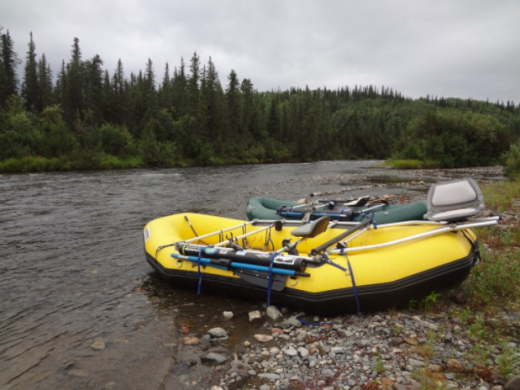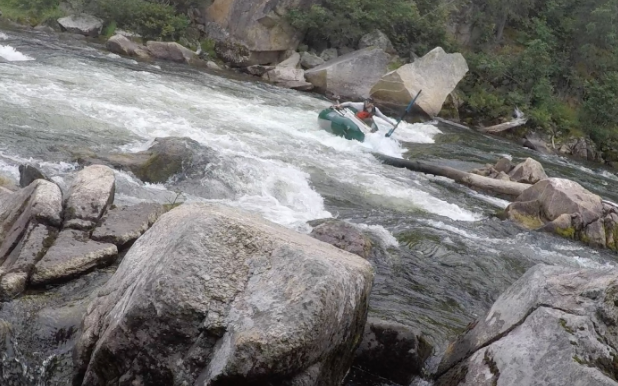By Eric Booton
I am in the washing machine. Stuck in the cycle of rushing water. The power of the water has me in its clutches and is reluctant to let go. I am trapped in the hydraulic power of the rapid. Water is rushing in and filling the boat. I am thankful for self b
ailing technology, but I am still convinced I am going down with the ship. I throw every pound of my body on the highside of the raft to avoid fully succumbing to the will of the water, wishing I had more weight to give.
I celebrated too soon. My chief concern was the pinch move just upstream of the small waterfall. After successfully navigating the tight chute, only inches wider than my boat, I was convinced I was in the clear. No such luck.
I noticed the log when we scouted the run and intentionally lined myself up to miss it. Knowing I would need some forward momentum to clear the vacuum power of the suckhole, I immediately began forward rowing as I came off the fall, dipping the blades, pushing with all my might, and watching in slow motion with despair as the left oar stuck on that damn log, spinning me sideways and lining me up for an unwanted ride.
Time slows down when things go wrong. I am told the initial look of fear on my face when I got sucked back into the hydraulic was one of sheer terror, but I have no shame. It took a couple seconds, but after sizing up the pickle I was stuck in, I was able to calm down and knew I could count on my friends for a timely rescue if things went south.
I felt prepared in the days before the trip, but my curiosity of the canyon loomed over my head. I’m no stranger to pushing my limits, but running a Class 3 canyon on the sticks was way outside my comfort zone. Based off Chad’s descriptions it sounded runnable, intimidating but manageable. The offer stood for him to run my boat down the canyon for me. But lets face it, that offer was off the table.
In the backcountry being prepared can mean life or death. Coming into unchartered waters, my wife and I followed the lead of our friends Chad and Erin who frequently float remote rivers. To prepare for the Class 3 canyon we portaged all of our gear, staged people at each of the hazardous sections, ran each boat with only one person in it, and were prepared with a throw rope to catch a swimmer.

It worked out in the end. Sure, I got wet, but I didn’t have to swim. What felt like an eternity was only a handful of minutes and after countless futile attempts, the oar I was ramming into the rushing water like a spear held and gave me the leverage I needed to escape the rapid’s hydraulic clutches.
At the bottom of the canyon I smiled as I rowed to shore. I may have botched the final move, but I was still pleased. It was a blur of excitement being back on dry land with my wife and friends, recounting the recovered mishaps of the Gulkana Canyon. We reveled in the adventure and “cheersed” hoppy cold ones as the clouds aligned and the sun found one small hole to beam down on us from for the first time in three days. I love the river life.
Eric Booton is the sportsmen’s outreach director for TU’s Alaska Program.



